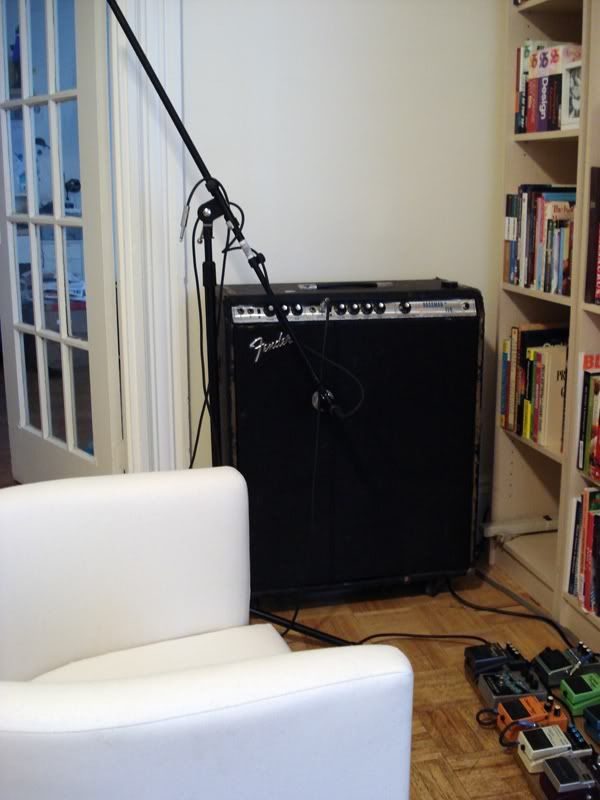
In a recent article, I made reference to my longtime love for The Clash - which should be no surprise to anyone who's ever read my music writing, or whom I've talked with about punk rock. I love the band despite their many shortcomings, and in my reignited passion for them the past few weeks, I've switched back into "research mode", digging up tons of information on them while pumping their music through my headphones. The first of their albums I'd ever heard was a crackly, chopped-up tape dub of
Give 'Em Enough Rope made for me by an 80-year-old man who lived across the street from my grandma. The same man who sold me a stack of punk and garage LPs at age 15 for a dime apiece (I was helping him sort out the "junk" from his recently purchased garage-full of albums). It was on the same 90-minute high-bias tape as most of the first Modern Lovers album (a good tape). I listened to that tape over and over and over that summer as I stained the new back porch for our neighbors, so my opinion is
most certainly biased, but even so: why the hell does everyone knock that album so much?
Let's do some math. There are ten tracks, five of which ("Safe European Home", "English Civil War", "Tommy Gun", "Last Gang In Town", and "Stay Free") are stone classics. Of the other five, three ("Guns On The Roof" "Drug-Stabbing Time", and "All The Young Punks") are good, but a bit "Clash-By-Numbers", "Cheapskates" is an attempt to stretch out their sonic template a bit, and "Julie's Been Working For The Drug Squad" is topical, stylistically-divergent filler. Not bad, but it doesn't add much to a powerful record.
So why all the hate, general public?
If we work backwards, I'm willing to concede that "Julie" could have been left off, but it doesn't do a lot of harm there, and would probably fit better on the more freewheeling
London Calling set, thanks to it's barroom piano. "Cheapskates" as well - I've always liked it, but it's not a
great song, I'll admit.
So that's the bottom of the barrel. If "Guns On The Roof" didn't have the
same exact riff as "Clash City Rockers", it would be a lot more forgivable, and does fit into that "Mott The Hoople Syndrome" of writing songs about the trials and tribulations of being in The Clash, along with "All The Young Punks". Some of the self-importance of the lyrics is offset by the brilliant arrangements of guitarist Mick Jones. Jones never really got his due (as many before me have stated) as a masterful arranger, and (unlike his bludgeoning contemporaries in the punk scene) wove tapestries of guitars to rise above the three chord blur that kept a lot of bands in the punk rock ghetto that The Clash escaped. Which brings me to "Drug-Stabbing Time". Not a great song, maybe even weaker than "Julie" in a way, in that it's so much of a musical step
backward in an album that pushes to move forward.
Which leaves us with five amazing songs, and an unfairly slandered producer. I'm not saying that Sandy Pearlman is completely innocent, but he seems like a good enough dude, and for the world-beating scope of the music this band was writing, the muscular sonics he brought to the early Blue Oyster Cult albums he produced make (no matter what any punk purist says)
perfect sense for the ambitious music The Clash were making at this point. BOC might have been the epitome of "non-punk" in 1978, but heard today, their first 3 albums sound more like Radio Birdman than Led Zep. Anyway, a smart musical director and arranger (Jones), combined with a producer who knows how to make things sound BIG (Pearlman), isn't a bad combination, unless all you want is wiry scrubbed guitars and inaudible bass.
So, the songs are slower (therefore longer, this wasn't a structural overhaul - it's still verse/chorus/verse), more "expansively" arranged, and less immediately topical (not as many "ripped from the headlines" songs as the self-titled debut). But what is there, under those parameters, might be among the best minutes the Clash released.
"Stay Free" is a favorite of mine. I love pop songs, and on top of that, when I discovered this album, I could identify with the protagonist of this song. I don't understand being on the dole in London in 1977, but I know what it's like to be a teenager dreaming of rock stardom, practicing my guitar "daily in my room", and getting into trouble. The bass-and-drums breakdown before the solo, the heart-tugging bridge... it's a charmer. It belongs in the middle of side two, but it fits perfectly there as a nice album track.
The bass guitar is what makes "Last Gang In Town" so great. The timing is a little rough, but that sells it. I already have a vision of the band as a gang of outlaws (I know they're art schoolers in reality, but why not give into the myth?), and it's just a solid "badass" song, with great Joe Strummer vocals and another good guitar arrangement. "English Civil War" is much the same, with a nice musical and lyrical reference to the
"When Johnny Comes Marching Home" chant of the U.S. Civil War, and although there are few specific ways to recommend it (above others) in writing, isn't writing about music like dancing about architecture?
The lynchpins of the album, though, are so good that it's almost a shame they're stuck as the first and third tracks, even though one makes a perfect album opener. "Tommy Gun" has a nice Topper Headon touch with the machine-gun-emulating snare rolls, but it's once again Jones' suitably "epic" lead guitar playing that offsets a great chord progression and reaching vocal with even more emotional depth. It's beed deservedly hailed as a classic, and should be on any collection that attempts to round up the best moments by the Clash. The vocals are hurt, angry, demanding scathing justice for someone who will chop down innocent people... it's a personal reaction to a political subject, which is far more profound than merely reporting on it, or supporting/condemning it. I don't care about whoever it is that's willing to die for their cause in the lyrics, but I do care about how Strummer feels about it. That's one of the clever tricks of this songwriting team: even if you don't agree with all their political views, they're not telling you about the problem, they're telling you about their perspective on the problem. I watch the news every day for at least 2 hours, and I'm sick of it. I want to know the human side of these stories. The Clash can do that like no other band.
What does that leave? Ah, yes. "Safe European Home". For years, on my fuzzy cassette, I could only make out impressionistic snatches of the lyrics, trying to piece together an image when you only have half the pieces of the puzzle. It's the story of Strummer and Jones' songwriting trip to Jamaica (the reggae-loving bassist, Paul Simonon, is apparently
still irritated at being left behind). They get there, get robbed, expect to see the rude boys and sound systems they've been listening to for years back in London, only to end up run out of town, scared for their lives, glad to be back and safe in their European home. Knowing more about the band's story, it's especially heartbreaking to hear how they were so thrilled to go, but the reality was so different from the fantasy... instead of lighting spliffs and vibing to some heavy dub, they were almost knifed and escaped with the clothes on their backs. The fact that they were largely honest in the lyrics is commendable - it would have been easy to write a song about the great time they had being punk outlaws in Jamaica, but why not be straightforward. "This isn't myth, this is real!"
Those powerful lyrics about the realities of fantasy are wrapped up in some of the most explosive three minutes and fifty seconds I've ever heard, and I've listened to a lot of goddamn rock music. It blasts out of the gate with a downstroke guitar stun, but cracks in half after the first line for a jumping-bean bassline and a call-and-response vocal. The chorus is a jarring, jagged call to arms. After being wrung out with more of that, suddenly, the skanking guitar line you almost hadn't noticed (but was playing underneath most of the song) becomes the only thing you hear, other than what seems to be a collection of
only backing vocal tracks. Now that this other guitar is the fixture, a rhythm section fades up underneath it, playing in a slightly different tempo and style than before, marrying the TNT rock 'n' roll of the opening with a lithe, snaking, and above all, sheet-metal-metallic reggae sound, creating a coda for the song that surpasses any other famous rock and roll coda you've ever heard. It makes
"Layla" look like a crackwhore. If this isn't the best song by The Clash, it deserves credit by making you absolutely believe that it is during it's play time.
(All) that said, why does this album get such a bad rap? I understand the U.K. press' initial backlash, in that with the Sex Pistols punk throne vacated after their implosion, the new kings were traipsing off to make an epic (label pun intended) hard rock album. On top of that, it didn't sound like it was recorded in a living room, and few of the songs were addressing the current issues in England at the time (furthering my assertion that purist punk should be viewed much as folk music was, or Public Enemy's theory that rap music was like "black people's CNN"). So maybe the initial reaction of "This isn't punk!" is justified, but as late as
1999 I was still getting shit for wearing a t-shirt with the cover on it. The contention then was it was a flaccid, overworked follow-up to a classic gritty record, probably still influenced by
the original '78 review from Greil Marcus in Rolling Stone. I like Marcus' writing, and I certainly respect his opinion on the matter, but I'm not afraid to stand up and say that I think he was wrong then. That was 30 years ago, though; maybe he's changed his stance since, and I don't know about it.
Coming from a particular aesthetic view of the world,
Rope must have seemed shocking after ONLY HEARING their first album. With hindsight, the Clash weren't just a great punk band, but one of the very best
rock 'n' roll bands, as borne out by their follow-up,
London Calling. But the world hadn't heard that when
Rope came out. I'm willing to accept the badmouthing up until about 1980. Then the game changes. Was the world so much smaller in 1997 that a 20-year-old review from Rolling Stone still held that much sway over public opinion? There weren't that many info sources back then (before the rise of the current state of the 'net), so I guess a long review like that could taint public opinion enough that many critics afterward would have just lazily regurgitated from THE source of music news, before people realized that R.S. was a stapled supply of backup toilet paper. The fact that the only CD version of the album until '99 was one of the most poorly-mastered CDs in history doesn't help. The Clash were among the most deserving of a remastering campaign, as the initial versions of their album on CD were among the most abrasive, tinny, and anemic transfers ever. The used, beat-up LPs sounded better, and when the released the live album in '99, it was the first time I'd ever heard a real decent kick drum on a Clash song.
So you can keep your derision, you can save your "sophomore jinx" bullshit. The only reason that
Give 'Em Enough Rope isn't considered an immediate classic boils down to punk didacticism, sloppy journalism, and the fact that it was bookended by
The Clash and
London Calling. So then next time I'm playing it (loudly), you can fucking keep your lazily regurgitated complaints. I'll give you some rope, you do the rest.
[For this and all other album reviews, I strongly suggest heading over to
grooveshark.com, who I am in no way affiliated with. Lots of free streaming music, and a great way to listen to songs from this album for free from anywhere without having to buy it first.]

















